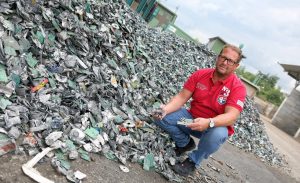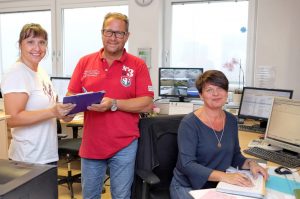 Gunther Panowitz has been managing director of MGG Metran for many years. Recycling has always been a topic for the future for the man from Amstetten since 1990. At that time, for example, he preferred to help with the grubby construction work of the separation plants in the Müller-Guttenbrunn Group than to take on a better-paid office job elsewhere. In the meantime, the 51-year-old has to deal with a wide variety of tasks in order to ensure the smooth operation of the plant in Kematen. Nevertheless, the love of tinkering on how systems can be optimized and improved has remained, as he reveals in this General Manager interview.
Gunther Panowitz has been managing director of MGG Metran for many years. Recycling has always been a topic for the future for the man from Amstetten since 1990. At that time, for example, he preferred to help with the grubby construction work of the separation plants in the Müller-Guttenbrunn Group than to take on a better-paid office job elsewhere. In the meantime, the 51-year-old has to deal with a wide variety of tasks in order to ensure the smooth operation of the plant in Kematen. Nevertheless, the love of tinkering on how systems can be optimized and improved has remained, as he reveals in this General Manager interview.
 Do you remember your early days here at MGG Metran?
Do you remember your early days here at MGG Metran?
Gunther Panowitz: Yes – I still have that clearly in my mind. In the early 1990s there was neither electricity nor telephone here. We took the water for the coffee machine from home – and not many people knew the word recycling. I started working in the Müller-Guttenbrunn Group in 1990. In the first year I was still employed in Amstetten before I joined Metran in 1991. Fortunately, things went steeply uphill afterwards and the infrastructure has been modernized from year to year.
How does the work present itself today?
Panowitz: In addition to a modern office building, we now have nine halls, five material bunkers, 15 separation and sorting plants and our own rail connection – this gives a rough overview. And the special thing here is that these systems are extremely versatile…
We can demetallize wood shredder fractions on one day, sort beverage cans the next day and separate aluminium sheets from stones 24 hours later. This allows us to tap into different sources of recyclable material, making us less dependent. The proportion of e-waste has grown particularly in recent years. In this area of WEEE shredder residue materials we will probably separate 25,000 – 30,000 tons of plastic-metal mixtures for recycling this year.
How large do the parts have to be in order to be separated?
Panowitz: We started separating metal into grain size 15 years ago. We are now able to separate metals and metal concentrates smaller than one millimetre from the recyclable materials. This is particularly important for expensive rare metals such as gold, silver or palladium. Due to their price, these are often applied very thinly or in extremely small parts. The recycling is all the more important when you know how energy-intensive and sometimes environmentally harmful the extraction of these metals is… These precious metals carry around a large CO2 backpack because they are extracted from the earth in very low concentrations. This applies to the rare precious metals as well as to aluminium. For example, a single tonne of aluminium made from recycled material can save 10 tonnes of CO2 compared to one tonne of “virgin” aluminium! For this reason, we are constantly working on the further development of our fine-grain processing system.
 Is it this constant tinkering that distinguishes MGG Metran and its employees?
Is it this constant tinkering that distinguishes MGG Metran and its employees?
Panowitz: Yes, indeed our team is making us very special. Our 45 employees take up ideas from many areas and implement them. With us there is no „If I only would have……then“, but a lot of „trial and error „. We are all very curious and we try a lot and see if we can do it differently. This is a lot of fun – and we definitely have a great working atmosphere. We laugh a lot because we can combine work with fun.
The many ideas are probably also necessary, as MGG Metran sorts very different materials.
 Panowitz: Our most important material is aluminium, followed by stainless steel, copper, zinc, lead and other metals. We now also have a plastics separation plant. As a result, we handle 90,000 tons of material per year – many even several times – in order to separate them, depending of the type of materials. We can sort a wide range of wastes. In order to do this we need different approaches. We separate materials according to their density, their colour or their friction properties. Basically it is often simple physics combined with the right idea and the the right technology….
Panowitz: Our most important material is aluminium, followed by stainless steel, copper, zinc, lead and other metals. We now also have a plastics separation plant. As a result, we handle 90,000 tons of material per year – many even several times – in order to separate them, depending of the type of materials. We can sort a wide range of wastes. In order to do this we need different approaches. We separate materials according to their density, their colour or their friction properties. Basically it is often simple physics combined with the right idea and the the right technology….
Or simply the right combination of techniques and/or ideas – right?
Panowitz: Of course, technology is constantly progressing. What is possible today with 3D cameras and sensors was unthinkable ten years ago. Computer performance has increased so much – and there will continue to be technological leaps. That is why we invest in the latest technology every two to three years.
The most recent investment concerned the so-called „Bobby Car project“, in which plastic composites with some metals are recycled. How large was the investment volume?
Panowitz: Yes, we saw years ago that we had to do something to prevent the expensive and valuable solid plastics from simply ending up in the incinerator and being burned. In total, we have invested almost two million euros in MGG Metran. Preliminary shredding with a mobile shredder alone meant an investment of almost 500,000 euros. These investments are often a certain risk, because it is not foreseeable whether everything can be implemented as planned. However, we are not afraid to tackle such important projects.
What is the current status of the „Bobby Car Project“?
Panowitz: „The project got off to a good start and we are now getting quite a lot of material from the waste collection centres. But I have to admit, there could be much more. Therefore an appeal to everyone who wants to dispose of old toys, shower walls, canisters and the like: Take them to the containers for our project in the waste collection centres. It is no problem at all if many metal parts are used. This is exactly what we have designed our system for.
Where will MGG Metran’s plant go in the future?
Panowitz: „We will continue to remain flexible and will always keep an eye on what waste we can expect in the future. Here you have to think ahead. For example, we used to separate the components of computers weighing 25 kilograms; today the materials come from light-weight smartphones. We have to adapt to these changes in advance. This means that we must look at least five years into the future. We will certainly also tackle new material flows and go even deeper than we can do today and separate even more homogeneously with the machines of tomorrow.
We wish you and your innovative team continued success.
